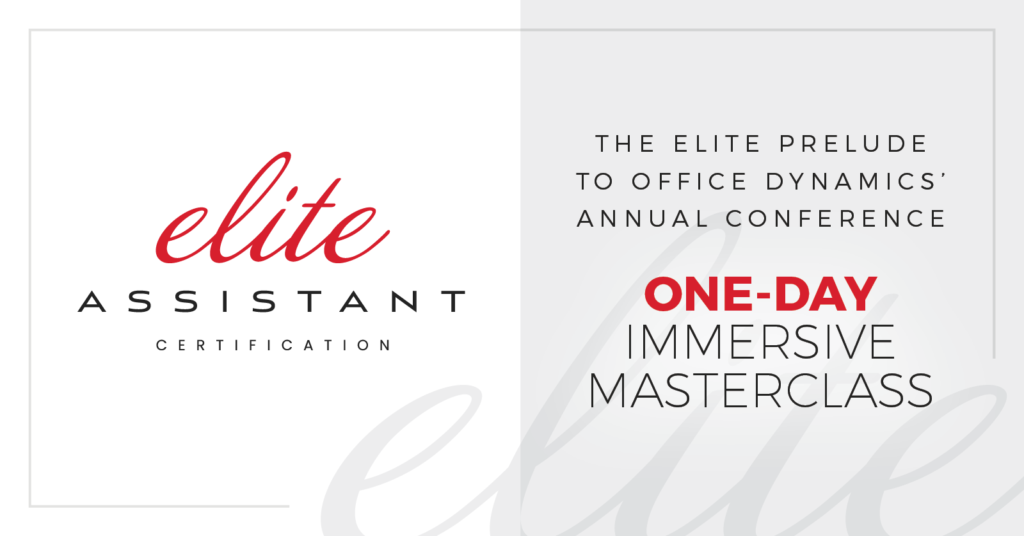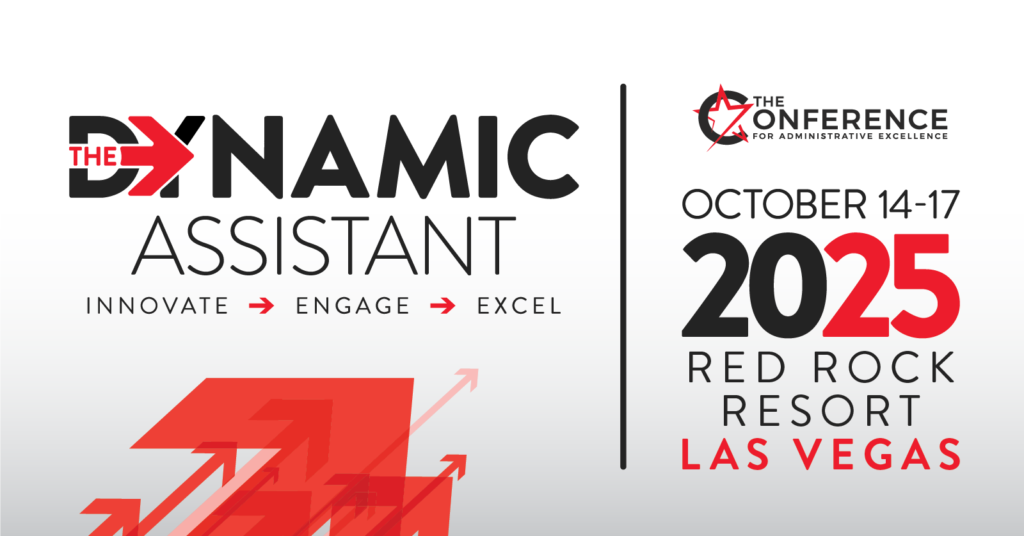What separates a good administrative professional from a truly great, strategic administrative assistant? According to Peggy Vasquez and Lisa Olsen—two of the industry’s most respected voices—it’s not just about skills. It’s about strategy, mindset, and presence.
In a recent power-packed webinar hosted by Joan Burge, Founder and CEO of Office Dynamics International, Peggy and Lisa pulled back the curtain on what it means to be an elite administrative assistant today. No fluff. No theory. Just decades of hard-earned wisdom translated into 10 actionable insights.
Here’s what you need to know to step into your next level.
Elite is Not a Title—It’s a Mindset
Peggy Vasquez opened the conversation by redefining what “elite” truly means in the administrative profession. It’s not about hierarchy or perfection. It’s about showing up every day with purpose, intention, and a commitment to excellence.
Elite assistants:
- Think strategically, not just tactically
- See themselves as business partners, not task takers
- Commit to lifelong learning and growth
Lisa Olsen added that being elite means becoming a beacon—someone others naturally look to for direction, support, and influence. It’s not about entitlement, it’s about empowerment.
1. Strategic Thinking Is Your Competitive Edge
Strategic thinking is no longer optional—it’s the foundation for career growth. Peggy emphasized that true strategic administrative assistants look beyond the to-do list and ask:
- Why does this task matter?
- How does this align with my executive’s goals?
- What can I do to anticipate future needs?
One powerful tip: Ask your executive for their top three priorities each day. Aligning with their vision helps you move from reactive to proactive—and makes you indispensable.
2. Lead Without the Title
Leadership isn’t tied to a job description. It’s about influence. As Peggy said: “Are you someone others want to follow?”
You lead through:
- How you show up
- How you think
- How you impact those around you
And the foundation? Self-leadership. If you manage yourself well, others will naturally trust and follow your lead.

3. Emotional Intelligence: Your Secret Weapon
Emotional intelligence (EQ) is the skill that will never be replaced by AI. Lisa described EQ as the ability to read the room, adapt communication styles, and manage your responses with grace.
This includes:
- Knowing your emotional triggers
- Responding instead of reacting
- Understanding how to communicate with maximum impact
Elite assistants practice emotional maturity, not just emotional awareness.
4. Influence Can’t Be Faked
Influence is earned through trust, consistency, and confidence. Lisa reminded attendees: “You can’t fake influence.”
To build it:
- Show up prepared
- Be present
- Communicate with intention
- Offer solutions, not just observations
People gravitate toward those who consistently add value—and that’s what influence is all about.
5. Use Practical Tools to Drive Growth
One of the standout tools shared was the Start, Stop, Continue feedback method. Instead of asking for generic feedback, this approach gives structure:
- What should I start doing?
- What should I stop doing?
- What should I continue doing?
This opens the door for meaningful improvement—and shows your executive that you’re serious about your growth.
6. Words Matter More Than You Think
Lisa highlighted how elite assistants treat communication like currency. Every email, every sentence, every word shapes your brand.
She challenged attendees to eliminate filler language like “please see the attached,” and instead use confident statements like “Attached is the report we discussed.”
Professional presence starts with professional language.
7. Brevity Builds Confidence
Over-explaining weakens your authority. Lisa put it bluntly: “Over-explaining kills confidence.”
Say more by saying less:
- Be clear and concise
- Get to the point
- Leave room for dialogue
Executives are busy. They’ll appreciate your ability to communicate quickly and with purpose.
8. Make the Most of Your One-on-One Time
Whether it’s a formal meeting or five minutes between calls, elite assistants know how to maximize every moment with their executive.
Prepare ahead:
- Bring a clear agenda
- Lead with solutions
- Use questions that deepen your understanding
It’s not about more time—it’s about better use of the time you have.
9. Know Your Emotional Maturity Quotient
Lisa introduced the idea of EMQ—Emotional Maturity Quotient—as a critical part of being an elite professional. It’s not just knowing what sets you off, but how you choose to respond.
Responsiveness is intentional. Reaction is impulsive.
In every interaction, choose calm. Choose thoughtfulness. Choose eliteness.
10. Don’t Wear Busyness as a Badge of Honor
Perhaps one of the most powerful reminders came when Lisa challenged the idea that being constantly busy is something to brag about.
Busyness is not the same as effectiveness. Elite assistants make time to think, plan, and learn—because they know that’s what moves the needle.
The Bottom Line: Elite Assistants Think Bigger
Elite assistants don’t settle. They challenge norms, embrace change, and elevate those around them.
If you want to move beyond task management into strategic partnership, these 10 insights offer a blueprint. It’s not easy—but it is worth it.



